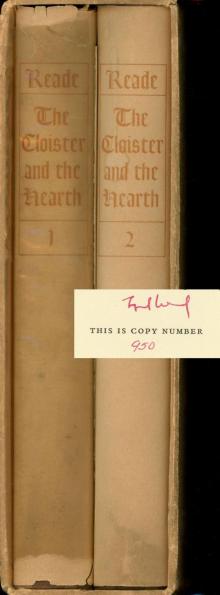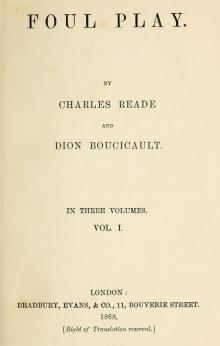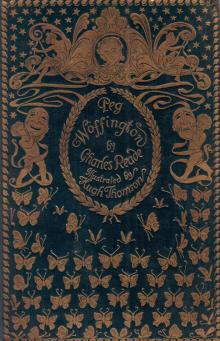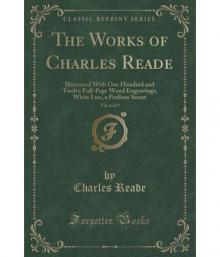- Home
- Charles Reade
Foul Play Page 2
Foul Play Read online
Page 2
CHAPTER II.
THAT same evening sat over their tea, in Norfolk Street, Strand, anothercouple, who were also father and son; but, in this pair, the Wardlawswere reversed. Michael Penfold was a reverend, gentle creature, withwhite hair, blue eyes and great timidity; why, if a stranger put to him aquestion he used to look all round the room before he ventured to answer.
Robert, his son, was a young man with a large brown eye, a mellow voice,square shoulders and a prompt and vigorous manner. Cricketer. Scholar.Parson.
They were talking hopefully together over a living Robert was going tobuy. It was near Oxford, he said, and would not prevent his continuing totake pupils. "But, father," said he, "it will be a place to take my wifeto if I ever have one; and, meantime, I hope you will run down now andthen, Saturday to Monday."
"That I will, Robert. Ah! how proud _she_ would have been to hear youpreach; it was always her dream, poor thing."
"Let us think she _can_ hear me," said Robert. "And I have got _you_still; the proceeds of this living will help me to lodge you morecomfortably."
"You are very good, Robert. I would rather see you spend it uponyourself; but, dear me, what a manager you must be to dress sobeautifully as you do, and send your old father presents as you do, andyet put by fourteen hundred pounds to buy this living."
"You are mistaken, sir, I have only saved four hundred; the oddthousand-- But that is a secret for the present."
"Oh, I am not inquisitive. I never was."
They then chatted about things of no importance whatever, and the oldgentleman was just lighting his candle to go to bed, when a visitor wasushered into the room.
The Penfolds looked a little surprised, but not much. They had no streetdoor all to themselves; no liveried dragons to interpose between them andunseasonable or unwelcome visitors.
The man was well dressed, with one exception; he wore a gold chain. Hehad a hooked nose, and a black, piercing eye. He stood at the door andobserved every person and thing in the room minutely before he spoke aword.
Then he said, quietly, "Mr. Michael Penfold, I believe."
"At your service, sir.
"And Mr. Robert Penfold."
"I am Robert Penfold. What is your business?"
"Pray is the 'Robert Penfold' at the back of this note your writing?"
"Certainly it is; they would not cash it without that."
"Oh, you got the money, then?"
"Of course I did."
"You have not parted with it, have you?"
"No."
"All the better." He then turned to Michael and looked at him earnestly amoment. "The fact is, sir," said he, "there is a little irregularityabout this bill which must be explained, or your son might be called onto refund the cash."
"'Irregularity about--a bill?" cried Michael Penfold, in dismay "Who isthe drawer? Let me see it. Oh, dear me, something wrong about a billindorsed by you, Robert?" and the old man began to shake piteously.
"Why, father," said Robert, "what are you afraid of? If the bill isirregular I can but return the money. It is in the house."
"The best way will be for Mr. Robert Penfold to go at once with me to thebill-broker; he lives but a few doors off. And you, sir, must stay hereand be responsible for the funds, till we return."
Robert Penfold took his hat directly, and went off with this mysteriousvisitor.
They had not gone many steps, when Robert's companion stopped, and,getting in front of him, said, "We can settle this matter here." At thesame time a policeman crossed the way and joined them; and another man,who was, in fact, a policeman in plain clothes, emerged from a doorwayand stood at Robert Penfold's back.
The detective, having thus surrounded him, threw off his disguise. "Myman," said he, "I ought to have done this job in your house. But I lookedat the worthy old gentleman and his gray hairs. I thought I'd spare himall I could. I have a warrant to arrest you for forgery!"
"Forgery! arrest me for forgery!" said Robert Penfold, with someamazement, but little emotion; for he hardly seemed to take it in, in allits horrible significance.
The next moment, however, he turned pale, and almost staggered under theblow.
"We had better go to Mr. Wardlaw," said he. "I entreat you to go to himwith me."
"Can't be done," said the detective. "Wardlaw has nothing to do with it.The bill is stopped. You are arrested by the gent that cashed it. Here isthe warrant; will you go quietly with us, or must I put the darbies on?"
Robert was violently agitated. "There is no need to arrest me," he cried;"I shall not run from my accuser. Hands off, I say. I'm a clergyman ofthe Church of England, and you shall not lay hands on me."
But one of the policemen did lay hands on him. Then the Reverend RobertPenfold shook him furiously off, and, with one active bound, sprang intothe middle of the road.
The officers went at him incautiously, and the head detective, as herushed forward, received a heavy blow on the neck and jaw that soundedalong the street, and sent him rolling in the mud; this was followed by aquick succession of staggering facers, administered right and left on theeyes and noses of the subordinates. These, however, though bruised andbleeding, succeeded at last in grappling their man, and all came to theground together, and there struggled furiously; every window in thestreet was open by this time, and at one the white hair and reverend faceof Michael Penfold looked out on this desperate and unseemly strugglewith hands that beat the air in helpless agony and inarticulate cries ofterror.
The detective got up and sat upon Robert Penfold's chest; and at last thethree forced the handcuffs upon him and took him in a cab to thestation-house.
Next day, before the magistrate, Wardlaw senior proved the note was aforgery, and Mr. Adams's partner swore to the prisoner as the person whohad presented and indorsed the note. The officers attended, two withblack eyes apiece, and one with his jaw bound up, and two sound teeth inhis pocket, which had been driven from their sockets by the prisoner inhis desperate attempt to escape. Their evidence hurt the prisoner, andthe magistrate refused bail.
The Reverend Robert Penfold was committed to prison, to be tried at theCentral Criminal Court on a charge of felony.
Wardlaw senior returned home, and told Wardlaw junior, who said not aword. He soon received a letter from Robert Penfold, which agitated himgreatly, and he promised to go to the prison and see him.
But he never went.
He was very miserable, a prey to an inward struggle. He dared not offendhis father on the eve of being made partner. Yet his heart bled forRobert Penfold.
He did what might perhaps have been expected from that pale eye andreceding chin--he temporized. He said to himself, "Before that horribletrial comes on, I shall be the house of Wardlaw, and able to draw a checkfor thousands. I'll buy off Adams at any price, and hush up the wholematter."
So he hoped, and hoped. But the accountant was slow, the publicprosecutor unusually quick; and, to young Wardlaw's agony, thepartnership deed was not ready when an imploring letter was put into hishands, urging him, by all that men hold sacred, to attend at the court asthe prisoner's witness.
This letter almost drove young Wardlaw mad. He went to Adams andentreated him not to carry the matter into court. But Adams wasinexorable. He had got his money, but would be revenged for the fright.
Baffled here, young Wardlaw went down to Oxford and shut himself up inhis own room, a prey to fear and remorse. He sported his oak, and neverwent out. All his exercise was that of a wild beast in its den, walkingrestlessly up and down.
But all his caution did not prevent the prisoner's solicitor from gettingto him. One morning, at seven o'clock, a clerk slipped in at the heels ofhis scout, and, coming to young Wardlaw's bedside, awoke him out of anuneasy slumber by serving him with a subpoena to appear as RobertPenfold's witness.
This last stroke finished him. His bodily health gave way under hismental distress. Gastric fever set in, and he was lying tossing andraving in delirium, while Robert Penfold was being tried
at the CentralCriminal Court.
The trial occupied six hours, and could easily be made ratherinteresting. But, for various reasons, with which it would not be goodtaste to trouble the reader, we decide to skim it.
The indictment contained two counts; one for forging the note of hand,the other for uttering it knowing it to be forged.
On the first count, the Crown was weak, and had to encounter the evidenceof Undercliff, the distinguished expert, who swore that the hand whichwrote "Robert Penfold" was not, in his opinion, the hand that had writtenthe body of the instrument. He gave many minute reasons in support ofthis. And nothing of any weight was advanced contra. The judge directedthe jury to acquit the prisoner on that count.
But, on the charge of uttering, the evidence was clear, and on thequestion of knowledge it was, perhaps, a disadvantage to the prisonerthat he was tried in England, and could not be heard in person, as hecould have been in a foreign court; above all, his resistance to theofficers eked out the presumption that he knew the note had been forgedby some person or other, who was probably his accomplice.
The absence of his witness, Wardlaw junior, was severely commented on byhis counsel; indeed, he appealed to the judge to commit the said Wardlawfor contempt of court. But Wardlaw senior was recalled, and swore that hehad left his son in a burning fever, not expected to live. And declared,with genuine emotion, that nothing but a high sense of public duty hadbrought _him_ hither from his dying son's bedside. He also told the courtthat Arthur's inability to clear his friend had really been the firstcause of his illness, from which he was not expected to recover.
The jury consulted together a long time; and, at last, brought in averdict of "GUILTY"; but recommended him to mercy on grounds which mightfairly have been alleged in favor of his innocence; but, if guilty,rather aggravated his crime.
Then an officer of the court inquired, in a sort of chant or recitative,whether the prisoner had anything to say why judgment should not be givenin accordance with the verdict.
It is easy to divest words of their meaning by false intonation; andprisoners in general receive this bit of singsong in dead silence. Forwhy? the chant conveys no idea to their ears, and they would as soonthink of _replying_ to the notes of a cuckoo.
But the Reverend Robert Penfold was in a keen agony that sharpened allhis senses; he caught the sense of the words in spite of the speaker, andclung wildly to the straw that monotonous machine held out. "My lord! mylord!" he cried, "I'll tell you the real reason why young Wardlaw is nothere."
The judge put up his hand with a gesture that enforced silence."Prisoner," said he, "I cannot go back to facts; the jury have dealt withthem. Judgment can be arrested only on grounds of law. On these you canbe heard. But, if you have none to offer, you must be silent and submitto your sentence." He then, without a pause, proceeded to point out theheinous character of the offense, but admitted there was one mitigatingcircumstance; and, in conclusion, he condemned the culprit to five years'penal servitude.
At this the poor wretch uttered a cry of anguish that was fearful, andclutched the dock convulsively.
Now a prisoner rarely speaks to a judge without revolting him by bad law,or bad logic, or hot words. But this wild cry was innocent of all these,and went straight from the heart in the dock to the heart on the judgmentseat. And so his lordship's voice trembled for a moment, and then becamefirm again, but solemn and humane.
"But," said he, "my experience tells me this is your first crime, and maypossibly be your last. I shall therefore use my influence that you maynot be associated with more hardened criminals, but may be sent out ofthis country to another, where you may begin life afresh, and, in thecourse of years, efface this dreadful stain. Give me hopes of you; beginyour repentance where now you stand, by blaming yourself, and no otherman. No man constrained you to utter a forged note, and to receive themoney; it was found in your possession. For such an act there can be nodefense in law, morality, or religion."
These words overpowered the culprit. He burst out crying with greatviolence.
But it did not last long. He became strangely composed all of a sudden;and said, "God forgive all concerned in this--but one--but one."
He then bowed respectfully, and like a gentleman, to the judge and thejury, and walked out of the dock with the air of a man who had partedwith emotion, and would march to the gallows now without flinching.
The counsel for the Crown required that the forged document should beimpounded.
"I was about to make the same demand," said the prisoner's counsel.
The judge snubbed them both, and said it was a matter of course.
Robert Penfold spent a year in separate confinement, and then, to curehim of its salutary effect (if any), was sent on board the hulk_Vengeance,_ and was herded with the greatest miscreants in creation.They did not reduce him to their level, but they injured his mind. And,before half his sentence had expired, he sailed for a penal colony, a manwith a hot coal in his bosom, a creature imbittered, poisoned; hopinglittle, believing little, fearing little, and hating much.
He took with him the prayer-book his mother had given him when he wasordained deacon. But he seldom read beyond the fly-leaf. There the poorlady had written at large her mother's heart, and her pious soul aspiringheavenward for her darling son. This, when all seemed darkest, he wouldsometimes run to with moist eyes. For he was sure of his mother's love,but almost doubted the justice of his God.

 The Cloister and the Hearth: A Tale of the Middle Ages
The Cloister and the Hearth: A Tale of the Middle Ages Foul Play
Foul Play Peg Woffington
Peg Woffington White Lies
White Lies